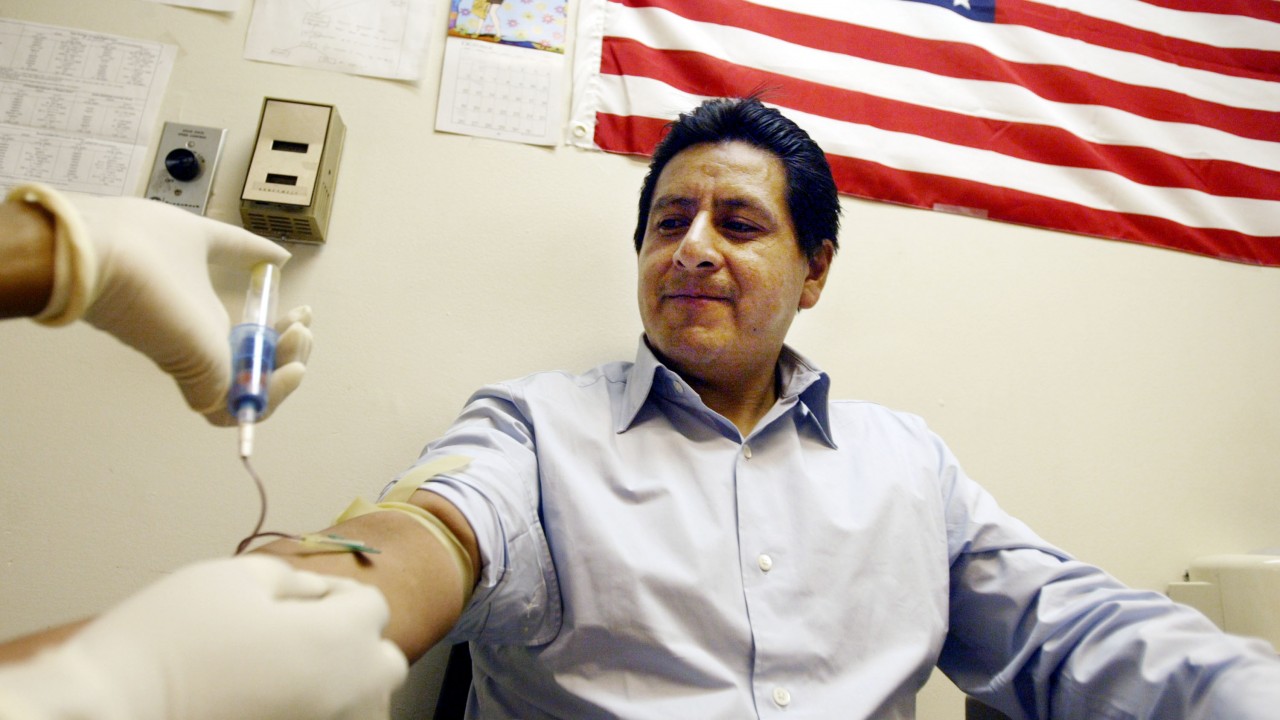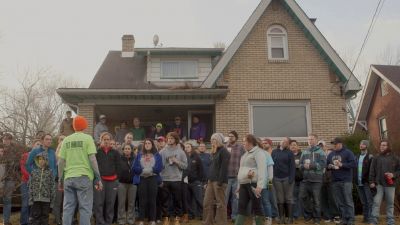
Vicente Benavidez has blood drawn for testing at the World Trade Center Worker and Volunteer Medical Screening Program October 1, 2003 in New York City. Benavidez worked for four months removing asbestos from Ground Zero following the September 11, 2001 terrorist attacks. (Photo by Mario Tama/Getty Images)
This post was originally published by The Center of Public Integrity, which is a nonprofit, nonpartisan investigative news organization in Washington, DC.
Guns take more than 30,000 lives in America each year.
But there’s a less-visible, even deadlier scourge that’s been mostly lost in an era of mass shootings and terrorism scares: work-related illness, which kills 50,000 annually, according to the best government estimate. Hundreds of thousands more are sickened by job-related exposures to toxic substances.
Occupational disease lacks the macabre drama of a San Bernardino or a Newtown. The bodies cannot be easily counted. The victims may hang on for years or decades before quietly succumbing. Often, their deaths are acknowledged only by their families, friends and former co-workers.
In a series called “Unequal Risk,” the Center for Public Integrity has tried to bring this little-understood, little-examined topic into the light. The most important takeaway: many work-related diseases are preventable.
Actually, it’s worse than that. In effect, these diseases are legally sanctioned by the United States government, which has made the conscious decision to treat workers more callously than the general public when it comes to protection against toxics.
The casualties of this policy have names: Chris Johnson, Mark Flores, Johnathan Welch, Gene Cooper. The first two struggle with debilitating conditions. The last two are dead – Welch at only 18.
What’s remarkable is that the agency charged with regulating toxics in the workplace, the Occupational Safety and Health Administration, admits that for the most part it’s unable to do so. OSHA, Congress, industry and the White House all bear responsibility.
The nation’s worker-protection laws are so weak — and offer so little deterrent value — that the departments of Labor and Justice just announced plans to bolster the use of environmental statutes as a workaround. Violations of the Occupational Safety and Health Act at most are misdemeanors, but environmental crimes can bring felony convictions. Agency officials say employers with safety problems are often environmental offenders as well; they’ve urged federal prosecutors to investigate both types of crimes together.
The devaluing of the American worker doesn’t stop with the infliction of illness. It continues when he or she tries to win benefits through state or federal compensation programs, or seeks redress in the courts.
Often those who litigate are doing so for their families, not themselves. Such is the case with Kris Penny, a 39-year-old Floridian who is dying of an asbestos-related cancer called mesothelioma. Penny believes he was exposed to asbestos while installing fiber-optic cable a little more than a decade ago. No one warned him to take precautions, he says. “I’m not going to be the last guy this happens to, I can promise you,” he told us the day before he underwent radical surgery in Baltimore last August.
The outlook for worker health in this country is not encouraging. Certain uses of asbestos are still legal in the United States, though more than 50 countries have banned it. While a relatively modest 400 metric tons of asbestos were consumed in the US last year, untold amounts are still embedded in buildings and infrastructure. Demolition, utility and other workers can knock it loose, sending invisible and potentially deadly fibers airborne.
“The stark realization that asbestos is legal, lethal, and everywhere is igniting feelings of anger, fear, and disgust,” says Linda Reinstein, CEO and co-founder of the Asbestos Disease Awareness Organization. “Similar to gun violence, many people have become numb and complacent about asbestos.” Reinstein, whose husband died of mesothelioma, has pressed tirelessly for a ban and has become a fixture on Capitol Hill.
Some members of Congress have different plans. In early January, the House is expected to vote on a bill proponents say would discourage “false or exaggerated” claims against asbestos trusts set up by corporations that made or used the mineral. The legislation, which passed the House two years ago, would require claimants to disclose personal information such as work histories, diagnoses, partial Social Security numbers and the amounts of money being sought.
Key sponsor Blake Farenthold, a Texas Republican whose district includes industry-rich Corpus Christi, says all of this is necessary to “ensure that funds meant to benefit legitimate future asbestos victims are not used to pay abusive claims.”
But the legislation has triggered fierce opposition, notably from mesothelioma victims.
“We have heard that [it] is needed because of an epidemic of fraud against the trusts,” nine widows and patients wrote in a February letter to lawmakers. “But the evidence doesn’t support this claim. This bill treats us and other asbestos victims like criminals rather than innocent victims of corporate deceit.”
The real aim, they wrote, is to create delays so claimants die before they can recover anything from the trusts: “It’s astonishing to us that, of all the issues Congress could be addressing relating to asbestos, you have chosen one that does nothing for victims, but … gives additional tools to the asbestos industry to drag out these cases and escape responsibility.”




